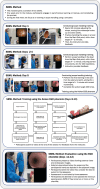Prospective study on comparison of simulation-based mastery learning versus conventional apprentice-based learning for basic endoscopy training
- PMID: 39484698
- PMCID: PMC11660195
- DOI: 10.1111/jgh.16794
Prospective study on comparison of simulation-based mastery learning versus conventional apprentice-based learning for basic endoscopy training
Abstract
Background and aim: The simulation-based mastery learning (SBML) method holds promise for improving the efficiency and effectiveness of endoscopy training. However, further study is required to establish its advantages over the traditional method. We aim to prospectively compare outcomes between gastrointestinal endoscopy trainees taught using SBML and those trained using conventional apprenticeship methods for upper endoscopy.
Methods: We performed a blinded, stepwise, comparative study with SBML participants deliberately practicing deconstructed steps of upper endoscopy and apprenticeship participants observing procedures. Three blinded trainers assessed trainees' skills using a validated esophagogastroduodenoscopy (EGD) tool pre-and post-training. The minimum pass standard (MPS) was set at a score > 2. We compared MPS of the groups using standard statistics and paired t-test.
Results: Six trainees were enrolled in the SBML group, and six in the conventional group. All trainees in the SBML group passed the minimum standard compared with the conventional group (P = 0.06). All trainees in the SBML group obtained significantly higher scores in overall basic GI endoscopic skills, esophageal, stomach, and duodenal observation skills than those of the conventional apprenticeship group (P < 0.05). The SBML curriculum led to three times more learning (Cohen's d = 6.5) than the conventional method (Cohen's d = 1.8).
Conclusion: This prospective study supports SBML for upper endoscopy training compared with the traditional apprentice-based method. SBML resulted in a steeper learning curve, as trainees learned three times more during the same period. Furthermore, trainees developed a uniform competency level at the end of training.
Keywords: Competency‐based education; Curriculum education; Endoscopy; Mastery learning; Simulation training.
© 2024 The Author(s). Journal of Gastroenterology and Hepatology published by Journal of Gastroenterology and Hepatology Foundation and John Wiley & Sons Australia, Ltd.
Figures




References
-
- BPS‐Statistics Indonesia . Statistical Yearbook of Indonesia 2023 [Internet]. Jakarta: BPS‐Statistics Indonesia, 2023. Available from: https://www.bps.go.id/en/publication/2023/02/28/18018f9896f09f03580a614b....
-
- Simadibrata M, Adiwinata R. Current issues of gastroenterology in Indonesia. Acta Med. Indones. 2017; 49: 270–278. - PubMed
-
- Indonesian Society for Digestive Endoscopy . Indonesian Society for Digestive Endoscopy Database. Jakarta; 2023.
-
- Makmun D. Present status of endoscopy, therapeutic endoscopy and the endoscopy training system in Indonesia. Dig. Endosc. 2014; 26: 2–9. - PubMed
Publication types
MeSH terms
LinkOut - more resources
Full Text Sources

